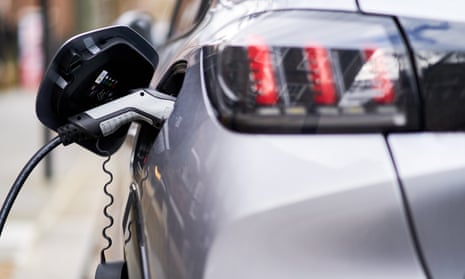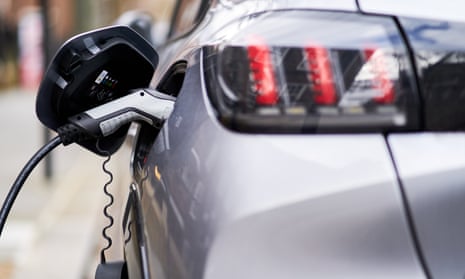UK Automakers Demand New EV Incentives
The UK automotive industry is urging the government to swiftly implement new incentives to revitalize the flagging electric vehicle (EV) market. Industry leaders are particularly keen for the government to “revisit the mandate” for zero-emission vehicles (ZEV), citing concerns over job losses and the potential for de-industrialization.

Industry research suggests the market for new EVs has become largely reliant on drivers who have already gone electric. Photograph: John Walton/PA
The Society of Motor Manufacturers and Traders (SMMT) released research showing that consumer demand for EVs is lower than anticipated. Only one in eight new car buyers now intend to switch to an EV in the next three years. This could put a huge strain on jobs within the sector.
The current UK mandate requires that 28% of new cars sold this year must be ZEVs, with manufacturers facing a £15,000 penalty for each non-compliant vehicle. The SMMT’s chief executive, Mike Hawes, stated that this regulatory framework has resulted in a decline in sales and production. He added that it is leading to plant closures and job losses.
Stellantis, the manufacturer of the Vauxhall van, cited the mandate as a reason for its decision to close its Luton factory in November, which affected approximately 1,100 jobs. Hawes suggested modifying the mandate. He emphasized the need to adapt it to changing circumstances, particularly concerning energy costs and consumer demand. According to Hawes, the industry spent £4.5 billion last year to discount EVs to hit sales targets.
Carmakers are advocating for cutting VAT on new vehicles and aligning the public EV charging point rate with the 5% household electricity rate.
At an industry conference in London, carmakers expressed their commitment to electrification, although they said that current targets are “challenging.”
Lisa Brankin, Ford’s managing director in Britain and Ireland, noted that the market sentiment has shifted. Ford reduced 800 UK jobs in November due to weaker-than-expected demand. She added that the government must act fast to boost demand. David George, the UK and Ireland chief executive of BMW, stated that the retail demand doesn’t align with the ZEV mandate. Paul Philpott, the chief executive of Kia UK, noted a need to incentivize and discount the best technology available.
Lilian Greenwood, the future of roads minister, said the government is working hard to boost charging infrastructure to meet ZEV targets, ensuring the industry has “the clear trajectory they deserve.” She emphasized that the government’s plan to ban the sale of new conventional cars from 2030 and vans from 2035 is “iron clad.” Responses to a consultation on how post-2030 measures can be relaxed will be released later in the spring.



